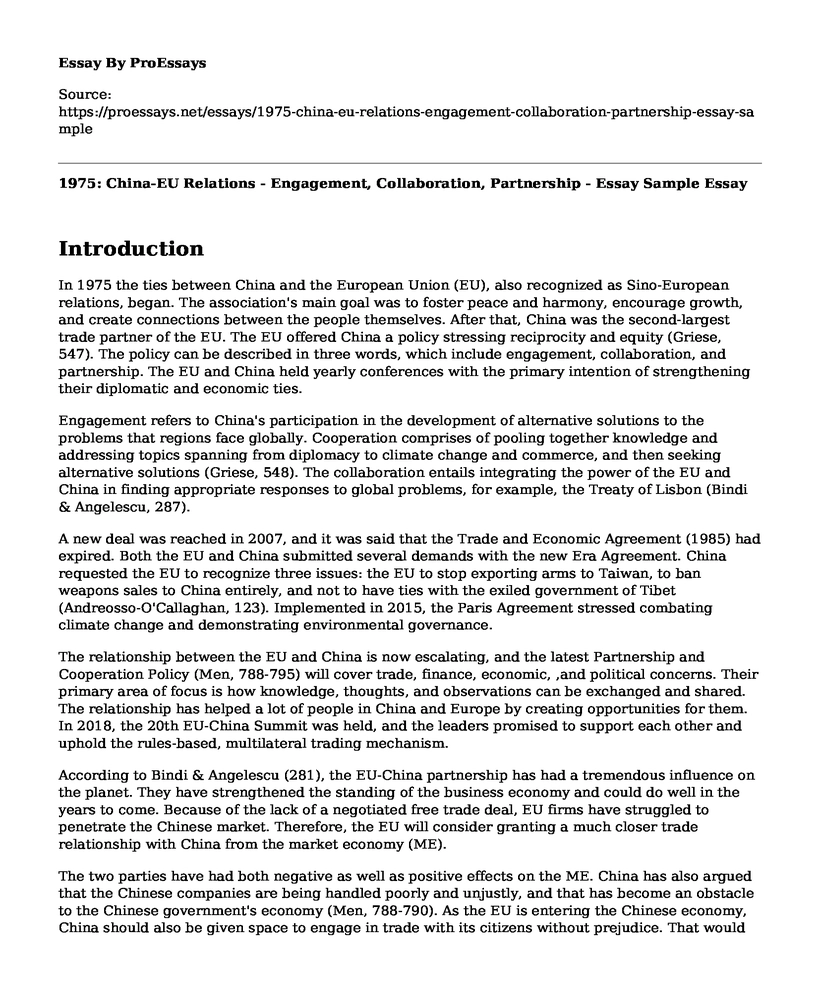Introduction
In 1975 the ties between China and the European Union (EU), also recognized as Sino-European relations, began. The association's main goal was to foster peace and harmony, encourage growth, and create connections between the people themselves. After that, China was the second-largest trade partner of the EU. The EU offered China a policy stressing reciprocity and equity (Griese, 547). The policy can be described in three words, which include engagement, collaboration, and partnership. The EU and China held yearly conferences with the primary intention of strengthening their diplomatic and economic ties.
Engagement refers to China's participation in the development of alternative solutions to the problems that regions face globally. Cooperation comprises of pooling together knowledge and addressing topics spanning from diplomacy to climate change and commerce, and then seeking alternative solutions (Griese, 548). The collaboration entails integrating the power of the EU and China in finding appropriate responses to global problems, for example, the Treaty of Lisbon (Bindi & Angelescu, 287).
A new deal was reached in 2007, and it was said that the Trade and Economic Agreement (1985) had expired. Both the EU and China submitted several demands with the new Era Agreement. China requested the EU to recognize three issues: the EU to stop exporting arms to Taiwan, to ban weapons sales to China entirely, and not to have ties with the exiled government of Tibet (Andreosso-O'Callaghan, 123). Implemented in 2015, the Paris Agreement stressed combating climate change and demonstrating environmental governance.
The relationship between the EU and China is now escalating, and the latest Partnership and Cooperation Policy (Men, 788-795) will cover trade, finance, economic, ,and political concerns. Their primary area of focus is how knowledge, thoughts, and observations can be exchanged and shared. The relationship has helped a lot of people in China and Europe by creating opportunities for them. In 2018, the 20th EU-China Summit was held, and the leaders promised to support each other and uphold the rules-based, multilateral trading mechanism.
According to Bindi & Angelescu (281), the EU-China partnership has had a tremendous influence on the planet. They have strengthened the standing of the business economy and could do well in the years to come. Because of the lack of a negotiated free trade deal, EU firms have struggled to penetrate the Chinese market. Therefore, the EU will consider granting a much closer trade relationship with China from the market economy (ME).
The two parties have had both negative as well as positive effects on the ME. China has also argued that the Chinese companies are being handled poorly and unjustly, and that has become an obstacle to the Chinese government's economy (Men, 788-790). As the EU is entering the Chinese economy, China should also be given space to engage in trade with its citizens without prejudice. That would deepen their relationship and boost their market economies.
With regards to technology, the EU has become China's leading trade partner (Van der Ploeg et al. 133-135). Much of the world's countries have become more dependent on these two development partners. The partners were able to come up with ideas away from the misunderstandings and welcomed economic ingenuity. That has improved the economy, not only between the two countries but internationally.
Conclusion
Conclusively, if these two partners continue to thrive in economic and political growth; they will connect well, reinforce relations, and concentrate more on environmental activities and global climate problem solutions. Many developing countries are building for economic and social development in these partnerships.
Works Cited
Andreosso-O'Callaghan, Bernadette. "Technology transfer: A mode of collaboration between the European Union and China." Europe-Asia Studies 51.1 (1999): 123-142.
Bindi Federiga & Angelescu Irina. The Foreign Policy of the European Union: Assessing Europe's Role in the World (Second Edition). Brookings Institution Press, 2012
Griese, Olaf. "EU-China relations-an assessment by the communications of the European union." Asia Europe Journal 4.4 (2006): 545-553.
Men, Jing. "Chinese perceptions of the European Union: A review of leading Chinese journals." European Law Journal12.6 (2006): 788-806.
Van der Ploeg, Jan Douwe, Ye Jingzhong, and Sergio Schneider. "Rural development through the construction of new, nested, markets: comparative perspectives from China, Brazil and the European Union." Journal of Peasant Studies39.1 (2012): 133-173.
Cite this page
1975: China-EU Relations - Engagement, Collaboration, Partnership - Essay Sample. (2023, May 11). Retrieved from https://proessays.net/essays/1975-china-eu-relations-engagement-collaboration-partnership-essay-sample
If you are the original author of this essay and no longer wish to have it published on the ProEssays website, please click below to request its removal:
- The SSI Federal Income Program - Paper Example
- Regulation and Deregulation and Its Impact on Intermodal Transport - Essay Sample
- Paper Example on Spain Conflict between the Catalan Government and Madrid
- Essay Sample on Globalization & Int'lization of Economies: Socio-Cultural, Political & Institutional Aspects
- Assignment Example on Microeconomics
- Essay Sample on Creating a Successful Democracy: Elements & Examples
- Essay Sample on Globalization of Business: Intensifying Competition for Enterprises







